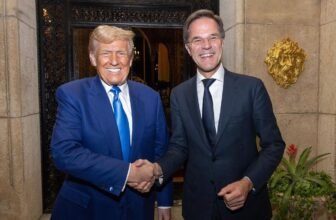
US Steps in for Meeting Between Russia and Ukraine While EU Leaders Hold Emergency Summit
In a crucial international development, European leaders are set to hold an emergency summit in Paris next week, addressing concerns over the United States engaging in direct peace talks with Russia over the Ukraine conflict. The exclusion of European nations from these discussions has raised alarms, as many believe Europe’s role in shaping Ukraine’s postwar future is being undermined.
European Response to US-Russia Talks
French President Emmanuel Macron has led the initiative by calling for a crisis summit, aiming to present a unified European stance against the US’s unilateral approach to peace negotiations.
UK Prime Minister Keir Starmer reinforced the need for transatlantic unity, stating:
“You can’t fight this war with one hand tied behind your back, and that is why we need transatlantic unity. The UK will do everything in its power to ensure that we keep the US and Europe together in the fight we face from Russia.”
The exclusion of European countries from these talks has raised serious concerns across the continent. Finnish President Alexander Stubb warned:
“There’s no situation or way in which we can discuss or negotiate Ukraine, Ukraine’s future, or a European security structure without Europeans.”
US and Russia Push Forward Without Europe
The United States has announced plans to mediate peace talks in Saudi Arabia between Russia and Ukraine, aiming to bring an end to the nearly three-year-long war. However, these discussions are moving forward without direct European participation.
US envoy Lt. Gen. Keith Kellogg stated:
“The US would act as an intermediary in the talks, with Ukraine and Russia as the two protagonists.”
European officials have strongly criticized this approach. German Chancellor Olaf Scholz expressed concerns over the US’s shifting stance, calling for a more unified peace resolution.
Ukraine’s Stance and European Defense Initiatives
Ukrainian President Volodymyr Zelenskyy has voiced concerns about being sidelined in negotiations that directly impact Ukraine’s sovereignty. He emphasized that:
“Nothing can be discussed on Ukraine without Ukraine.”
Fearing exclusion from the peace process and growing uncertainty about continued US support, Zelenskyy has proposed the creation of a ‘European Armed Forces’. This initiative is aimed at strengthening Europe’s defense capabilities and reducing dependence on external powers.
Impact on NATO and Transatlantic Relations
The US’s decision to exclude European allies from the peace talks has triggered discussions about the future of NATO and the transatlantic alliance.
UK Prime Minister Keir Starmer warned that the lack of European involvement presents a significant security threat, stressing the need for Europe to invest in its defense strategies and maintain NATO unity.
FAQ
Why are European leaders concerned about being excluded from the US-Russia peace talks?
European leaders worry that their exclusion from negotiations weakens their influence over Ukraine’s future and regional security. They argue that any lasting resolution must include all directly affected stakeholders.
What is Ukraine’s stance on the current peace negotiations?
Ukraine has firmly stated that it must have a central role in shaping its sovereignty and territorial integrity. President Zelenskyy has demanded that both Ukraine and European nations be included in the talks.
How does excluding Europe from the peace talks impact NATO?
Excluding European nations from major security discussions could lead to tensions between the US and Europe. This might push European countries to reassess their defense priorities, potentially leading to increased defense spending and new security initiatives independent of the US.
As the situation develops, ensuring an inclusive and transparent negotiation process remains crucial for achieving a sustainable and balanced resolution to the Ukraine conflict.
We encourage readers to share their thoughts on this unfolding situation and its impact on global security and international relations.






